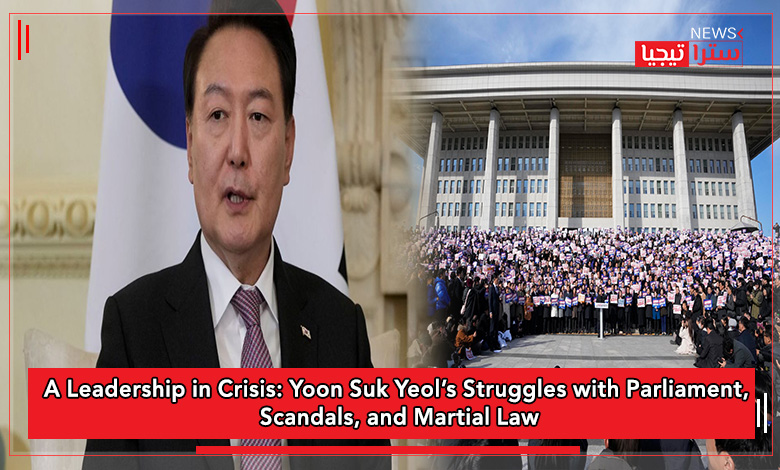Department of Strategic Security and Military Research and Studies 05-12-2024
South Korean President Yoon Suk Yeol’s administration is embroiled in controversy following escalating conflicts with the opposition-controlled National Assembly, accusations of corruption linked to his wife, and his unprecedented declaration of martial law. These events have drawn widespread domestic and international scrutiny, raising questions about South Korea’s democratic resilience.
The Foundation of Struggles
President Yoon’s tenure, beginning in May 2022, has been marked by consistent tensions with the Democratic Party of Korea (DPK). Early conflicts arose from his push for:
Judicial Reforms: Yoon, a former prosecutor-general, aimed to centralize prosecutorial powers. Critics, particularly the DPK, accused him of using these reforms to shield allies from scrutiny.
Economic Policies: His administration’s corporate tax cuts and limited social spending were perceived as favoring the elite. Rising inflation and unemployment only fueled public discontent.
Foreign Relations: Yoon’s strong alignment with the U.S. and rapprochement with Japan faced criticism for neglecting national interests and exacerbating public disapproval.
The Scandal That Shook the Presidency
A pivotal moment came in mid-2024 when allegations surfaced implicating First Lady Kim Keon-hee in bribery. Reports alleged her involvement in receiving illicit funds from business tycoons in exchange for political favors. Although Yoon denied the accusations, the scandal eroded public trust and emboldened opposition calls for accountability.
The bribery claims amplified existing discontent, linking them to broader criticisms of Yoon’s governance. Protesters increasingly cited the scandal during mass demonstrations in Seoul, seeing it as emblematic of corruption and privilege in the administration.
Martial Law Declaration
On November 28, 2024, Yoon declared martial law following days of protests against government corruption, economic grievances, and declining civil liberties. Framing it as a measure to ensure national security amidst fears of unrest, he deployed the military to quell demonstrations in the capital. This was the first such declaration since South Korea’s democratization in the late 1980s.
The move was met with bipartisan condemnation. The DPK accused Yoon of using the military to suppress dissent, likening his actions to authoritarian regimes. International observers also criticized the decision, warning of democratic backsliding.
Though martial law was lifted on December 2, the damage to Yoon’s political credibility was substantial. The National Assembly passed resolutions denouncing his actions, and impeachment discussions gained traction.
Worsening Relations with Parliament
Yoon’s decision to bypass parliamentary channels during the martial law declaration exacerbated tensions. Key incidents include:
December 3, 2024: The National Assembly initiated impeachment proceedings, citing constitutional violations.
Cabinet Resignations: Several senior advisors and ministers, critical of Yoon’s approach, stepped down, weakening his political base.
Judicial Oversight: South Korea’s Constitutional Court announced an investigation into the legality of Yoon’s actions, a move seen as pivotal in determining his presidency’s future.
Public Sentiment and Political Fallout
Yoon’s approval ratings have plummeted to historic lows, falling below 20% by December 2024. Protesters continue to demand his resignation, with demonstrations growing increasingly organized and gaining international attention.
The opposition has capitalized on public anger, calling for snap elections and vowing to reverse Yoon’s policies. Even within his conservative bloc, cracks are appearing, with moderate voices urging a shift toward reconciliation.
Implications for South Korea’s Democracy
The current crisis underscores significant vulnerabilities in South Korea’s democratic system. Observers warn that:
Democratic Norms: Yoon’s actions risk setting dangerous precedents for executive overreach.
Institutional Trust: Scandals and martial law have eroded faith in government institutions.
Geopolitical Stability: Prolonged instability could weaken South Korea’s role in addressing regional challenges, including North Korean threats.
What Lies Ahead for Yoon Suk Yeol
President Yoon’s political survival depends on his ability to address mounting challenges. Key scenarios include:
Impeachment or Resignation: If impeachment proceeds, Yoon could face removal from office. This would mark a significant turning point in South Korea’s political history.
Rebuilding Credibility: Comprehensive economic reforms, addressing corruption allegations transparently, and engaging with the opposition could mitigate tensions.
International Reactions: Yoon’s ability to maintain South Korea’s alliances and commitments, particularly with the U.S., will be crucial in preserving his global standing.
Conclusion
Yoon Suk Yeol’s presidency is at a crossroads, characterized by deepening domestic strife and international skepticism. His response to the challenges ahead will not only define his legacy but also shape South Korea’s democratic trajectory. Whether he navigates these turbulent waters or succumbs to political pressures will have lasting implications for the nation.

